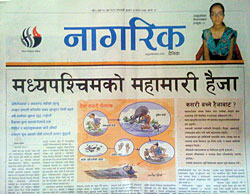 |
Poor villagers have been forced to take the sick to expensive private clinics as the 30 camps set up by the government are inadequate. Mules carry medicines to many villages, but not enough.
Ahewa Khatri of Bishnu Medical says contamination of water and stale food are the two main reasons for the propagation of cholera in Jajarkot. He added that the epidemic could be controlled if health workers were sent to each village, antibiotics provided to each patient, awareness programs on health and sanitation organised and the entire water bodies treated.
Meanwhile, two and half months have passed since the epidemic started and the government still hasn't figured out whether it's cholera or diarrhoea. On the request of the government, World Health Organisation first sent a team to distribute food to the blighted area and collect stool and blood samples. After lab tests in Bangkok, WHO identified e.Coli bacteria in the samples from Jajarkot and coliform in the samples from Rukum. The Epidemiology and Disease Control Division admitted that it doesn't know what the epidemic is although it has studied several samples. All in all, the ministry of health has reported that currently 294 health workers are working in Jajarkot and that eight kg of medicines have been distributed.


